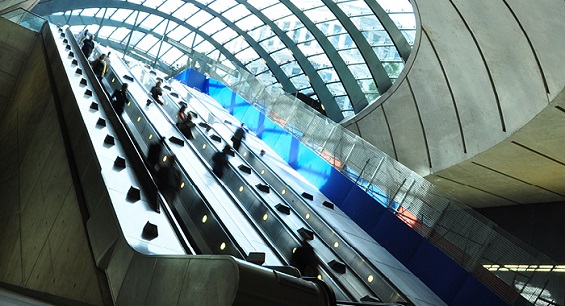At airports, train and metro stations, escalators form the important lifeline in vertical transport flows. Most station or airport managers would prefer to avoid an escalator that stops running during rush hour. That is why they prefer to invest in a solid escalator with a long service life. Escalator manufacturers respond to this with so-called ‘heavy duty escalators’ in their product portfolio. “However, not all heavy duty escalators are the same”, escalator expert Azaad Santoe of Liftinstituut says.
 Unambiguity in heavy duty requirements
Unambiguity in heavy duty requirements
Santoe: “Each manufacturer is responsible for establishing the technical requirements to be met by such a durable escalator. This does not always make the choice for transport companies and airports easy: what exactly should you need to pay attention to? Are you sure you’re not comparing apples and oranges? In my daily work as an escalator certifier, I work with a set of requirements that we at Liftinstituut have drawn up on the basis of international heavy-duty definitions for escalators and thirty years of experience in escalators.”
Safety margin in the peak load of the escalator
“The right materials and the right components can help extend the life of the escalator. This requires particular attention to the peak load. During peak hours, escalators are always used very intensively. Are components like an engine capable of withstanding such a huge load? As an escalator buyer you can, of course, rely exactly on the maximum peak load as specified by the escalator manufacturer. However, based on our experience, we know that is a better option to keep an extra safety margin. This can be achieved with a slightly heavier engine. This will probably also extend the service life of the escalator.”
Escalator installation requires expertise and documentation
In addition to the quality of the product, the durability of the escalator also depends on proper installation and maintenance, Santoe states. “First of all, you need an expert mechanic, but detailed documentation is also essential. Without a clear description and explanatory pictures, for example about tensioning and aligning the chain, even the best mechanic can make a mistake. Based on our technical background, we know exactly which actions need to be described in the documentation.”
Life-extending maintenance for escalators
The work performed by the maintenance company also determines the service life of an escalator. “The chain may have an automatic lubrication system, but this does not prevent dirt from accumulating between the chain links. Such dust particles cause scratches that can affect the surface hardness of the links. These scratches can be prevented by requiring the maintenance technician to apply oil between the pins with a brush. In the same way, we prescribe life-extending maintenance operations in detail.”
Guidance around the world
Liftinstituut has become a welcome partner for metro companies and airports all over the world. Santoe: “We guide and evaluate the entire production process during a Factory Acceptance Test (FAT). If desired, we also conduct an on-site Site Acceptance Test (SAT) to verify FAT compliance. This way, our customers know for sure that their investment in heavy duty escalators is worth every penny.”





